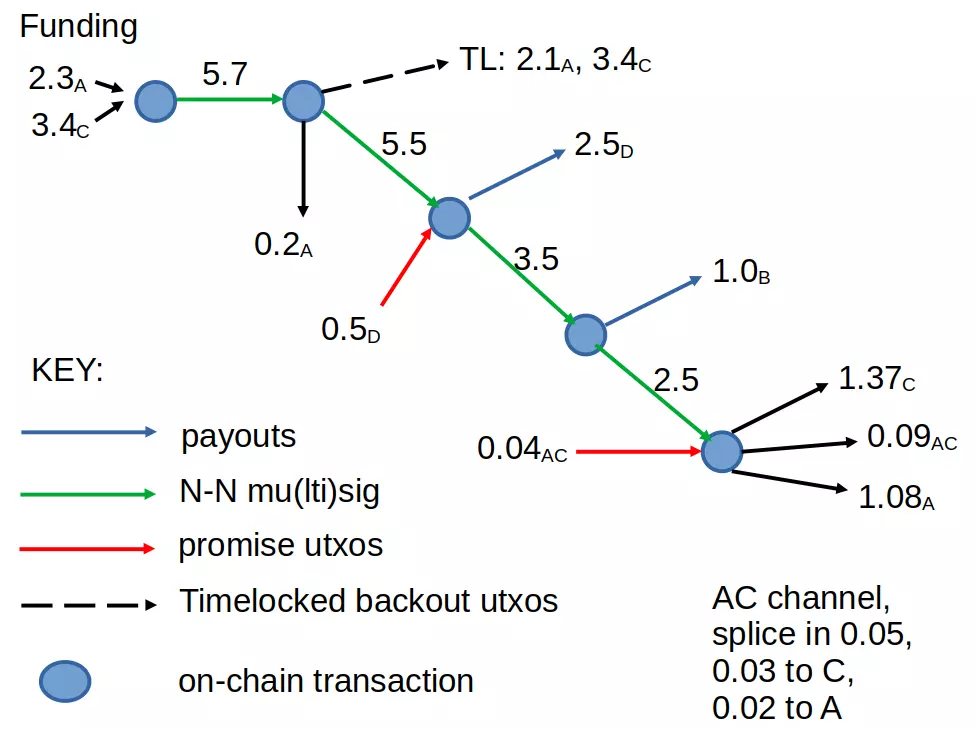Bitcoin privacy showerthought: most users don't have 100kUSD+ in bitcoin. Usually it's 1k-50kUSD range. More specifically, even if they do have a large stash, the part that's ever active (i.e. they spend it, move it) is in that smaller range. (source: I made it the fuck up). Assuming that is correct, why not have a wallet that actively manages your privacy like this: on a regular but somewhat randomized schedule, it performs submarine swaps moving random chunks of your money (anything from $50 to $1000) into a channel. On an equally random schedule it can move money back, in reverse, to keep your money onchain most of the time, if that's what you prefer (you can keep a on-chain off-chain split percentage as a setting perhaps). The swaps are done with third parties. What "comes out" the other side will be very difficult to link to the original onchain coins. This will cost a bit in fees but I think for a certain midrange of amounts the fees will be very tolerable (it may not be a good solution when individual chunks go down to 2 figures, not sure). Probably not worse than coinjoin fees and I think the outcome is better, or at least it could be, if the third party swappers were actively trying to create outputs without fingerprints like hash preimages (insert technical argument).
(It would be of course important that the "after" account is different from the "before" to prevent co-spending. That's one thing that too few people do it seems to me, to partition wallets into multiple accounts for different usages (well apart from privacy wallets ofc).)

waxwing /
npub1va…knuu7
2025-03-29 12:26:58
Author Public Key
npub1vadcfln4ugt2h9ruwsuwu5vu5am4xaka7pw6m7axy79aqyhp6u5q9knuu7Published at
2025-03-29 12:26:58Event JSON
{
"id": "78883b4db2ccca584f390a9a1726b6d9cde369845c0788decb03e1f822d52936",
"pubkey": "675b84fe75e216ab947c7438ee519ca7775376ddf05dadfba6278bd012e1d728",
"created_at": 1743251218,
"kind": 1,
"tags": [],
"content": "Bitcoin privacy showerthought: most users don't have 100kUSD+ in bitcoin. Usually it's 1k-50kUSD range. More specifically, even if they do have a large stash, the part that's ever active (i.e. they spend it, move it) is in that smaller range. (source: I made it the fuck up). Assuming that is correct, why not have a wallet that actively manages your privacy like this: on a regular but somewhat randomized schedule, it performs submarine swaps moving random chunks of your money (anything from $50 to $1000) into a channel. On an equally random schedule it can move money back, in reverse, to keep your money onchain most of the time, if that's what you prefer (you can keep a on-chain off-chain split percentage as a setting perhaps). The swaps are done with third parties. What \"comes out\" the other side will be very difficult to link to the original onchain coins. This will cost a bit in fees but I think for a certain midrange of amounts the fees will be very tolerable (it may not be a good solution when individual chunks go down to 2 figures, not sure). Probably not worse than coinjoin fees and I think the outcome is better, or at least it could be, if the third party swappers were actively trying to create outputs without fingerprints like hash preimages (insert technical argument).\n\n(It would be of course important that the \"after\" account is different from the \"before\" to prevent co-spending. That's one thing that too few people do it seems to me, to partition wallets into multiple accounts for different usages (well apart from privacy wallets ofc).)",
"sig": "cdf02d74e5f9c934171be09d29c4b1921f8d96400b59d51c65f7b07718106e71232b8926bc15fcff97f55db865936f12fe2c6a26c9470aad64d1f06c5f44b79b"
}